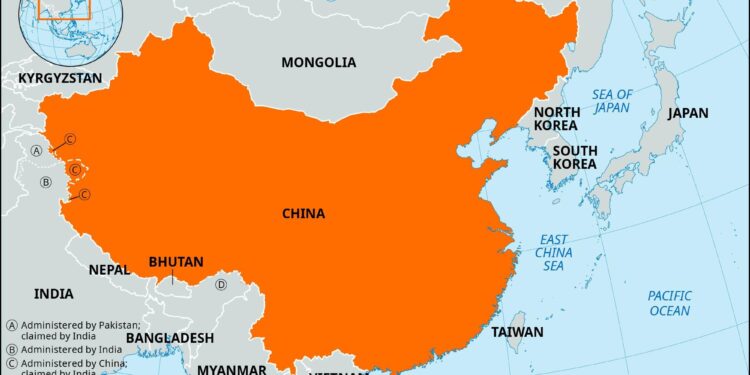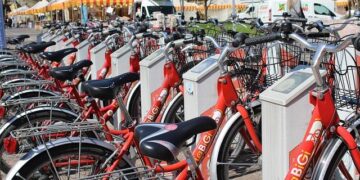In a significant development in the southeastern region of Asia, the leader of the Myanmar National Democratic Alliance Army (MNDAA) has reportedly been placed under house arrest in Kunming, China. This move underscores Beijing’s ongoing efforts to manage its border areas and maintain stability amidst escalating tensions in Myanmar’s northern states. The MNDAA, an armed ethnic group engaged in a long-standing conflict with the Myanmar government, has drawn international attention due to its strategic role in the region’s complex geopolitical landscape. As China navigates its relations with Myanmar, the implications of this detention could have far-reaching effects on both regional security and the ongoing peace negotiations in Myanmar. This article delves into the background of the MNDAA, the recent circumstances surrounding the leader’s house arrest, and the broader context of China’s involvement in Myanmar’s multifaceted conflict.
China’s Strategic Move: House Arrest of MNDAA Leader Raises Questions
In a surprising turn of events, the Chinese government has placed the leader of the Myanmar National Democratic Alliance Army (MNDAA) under house arrest in Kunming. This decision raises significant concerns regarding China’s approach to regional stability, particularly as it relates to the tumultuous landscape of northern Myanmar. Observers are questioning whether this move signifies an attempt by Beijing to exert greater control over ethnic armed groups or if it reflects a strategic recalibration in light of ongoing conflicts in the region.
The implications of this house arrest extend beyond the immediate impacts on the MNDAA. Analysts are noting that it may signal a shift in China’s policy towards ethnic insurgencies near its borders. Potential consequences include:
- Increased tensions: Local and regional actors may respond aggressively to perceived Chinese intervention.
- Realignment of alliances: Other ethnic armed groups might reassess their relationship with Beijing.
- Heightened scrutiny: The international community may place greater emphasis on China’s role in Myanmar’s internal conflicts.
In light of this development, many stakeholders are advocating for a clearer dialogue between China and Myanmar’s ethnic factions. Observers are calling for transparency regarding the underlying motives of the Chinese government, emphasizing the need for a comprehensive framework for peace that respects the autonomy of local ethnic groups while ensuring regional security. As the situation unfolds, the dynamics between ethnic armed groups and the state, especially under external influences, will be crucial in shaping the future of Myanmar.
Implications for Regional Stability and Ethnic Armed Groups in Myanmar
The unexpected house arrest of the leader of the Myanmar National Democratic Alliance Army (MNDAA) in Kunming, China, underscores the delicate balance of regional power dynamics and the impact on ethnic armed groups within Myanmar. China’s influence over this critical actor could lead to significant shifts in operations, allegiances, and the overall landscape of conflict in Myanmar’s northern regions. The MNDAA has previously engaged in bouts of military confrontation with the Myanmar government, seeking greater autonomy and rights for the ethnic Kokang people. With their leader now under detainment, the group faces uncertainties that may either push them toward negotiation or exacerbate tensions if their demands remain unmet.
As a leaderless entity, the MNDAA may experience fragmentation, potentially causing a surge in violent actions or a chaotic vacuum of power. This situation raises alarm regarding possible spillover effects into neighboring countries, particularly as other ethnic armed groups may seize the moment to assert their influence or expand operations. Key implications to monitor include:
- Increased military mobilization by rival factions within Myanmar.
- Potential refugee crises as communities flee conflict zones.
- Heightened regional tensions, particularly with neighboring countries concerned about security and stability.
These developments could challenge China’s role as a mediator in the region, forcing Beijing to reassess its strategy towards managing armed groups like the MNDAA. In a broader context, the ramifications of this incident could herald new approaches from ethnic groups in Myanmar, compelling them to recalibrate alliances and strategies. The international community must remain attentive to these shifts, as they could drastically reshape the existing equilibrium in the complex tapestry of Myanmar’s ethnic conflicts.
Recommendations for International Response and Diplomatic Engagement
In light of the recent developments concerning the detention of the MNDAA leader, it is essential for the international community to adopt a proactive stance. To effectively address the situation and promote stability in the region, diplomatic engagement should focus on the following strategies:
- Multilateral Dialogue: Encourage discussions among regional players, including ASEAN nations and China, to facilitate a collaborative approach in resolving tensions.
- Human Rights Monitoring: Advocate for the establishment of an independent monitoring framework to ensure the protection of civil liberties and the rights of ethnic minorities in Myanmar.
- Incentives for Cooperation: Offer diplomatic incentives for China to exert positive influence over its neighbors, including economic partnerships and development assistance focused on conflict resolution.
- Public Awareness Campaigns: Increase international awareness regarding the plight of ethnic groups in Myanmar, aiming to garner support for peaceful solutions.
Furthermore, engagement should also include a concerted effort to communicate the repercussions of internal oppression on regional security. The table below outlines potential actions for international stakeholders:
| Action Item | Responsible Entities | Expected Outcome |
|---|---|---|
| Facilitate Peace Talks | UN, ASEAN, China | Lowered tensions and conflict resolution |
| Provide Humanitarian Aid | NGOs, International Agencies | Improved conditions for affected populations |
| Sanction Violations of Rights | Global Human Rights Organizations | Accountability and deterrence of future abuses |
To Conclude
In conclusion, the house arrest of the MNDAA leader in Kunming reflects the Chinese government’s ongoing efforts to manage ethnic tensions and insurgent activities in the region. This development underscores the delicate balance Beijing seeks to maintain in its relations with ethnic minority groups, particularly in border areas where instability can have broader implications for national security. As the situation unfolds, it will be crucial to monitor how this decision impacts the dynamics within the MNDAA and the wider implications for Chinese policies towards ethnic minorities. The international community will be watching closely, as such internal actions may reverberate beyond China’s borders, influencing regional stability and cross-border relations.














